Halfway down into 'The Pitt'
Chatting with Noah Wyle and friends, plus the 'SNL' anniversary special, 'Severance,' 'White Lotus,' and more
This week’s What’s Alan Watching? newsletter coming up just as soon as I interview the Archbishop of Canterbury…
He’s not a doctor, but he plays one on TV
This week’s episode of The Pitt is the eighth of 15 episodes for Season One, which makes it the exact midpoint of this first batch. (A second season was just ordered, in case you were worried.) It’s also a pretty fantastic, emotionally overwhelming hour of television, with the resolution of the fentanyl overdose subplot overlapping with two new stories, one involving a drowning victim, the other involving an older patient who was part of Pittsburgh emergency medicine history.
Conveniently, it comes not long after the show wrapped production on this season, which meant I finally had an excuse to speak with the show’s top producers — creator R. Scott Gemill, star Noah Wyle, and director John Wells — at the exact moment they had time to do a deep dive interview about what has made this show so great. (And also to talk about what medical knowledge Wyle has retained since he last played John Truman Carter.) While they’re not allowed to comment on the lawsuit by the Michael Crichton estate — which alleges that The Pitt is an ER sequel in everything but name, to avoid Warner Bros. having to pay them(*) — you will be unsurprised to learn that a good chunk of the conversation was spent on the ways The Pitt does and does not resemble the last hospital show that Wells, Wyle, and Gemill worked on together. Last year’s binge finally paid off professionally, as the guys were all impressed/surprised that I recognized the parallel between one of this week’s storylines and a plot from one of the final ER episodes.
(*) I’m not a lawyer, nor did I stay at a Holiday Inn Express last night, so I can’t offer an informed opinion about the suit’s merit. That said, there are so many things The Pitt does that have been done on so many other hospital dramas — if only occasionally done this well — that even if it at one point was meant to follow an older Carter at County General, in the same real-time format, this version really doesn’t feel beholden to the show Crichton created. Any attorneys among you might be inclined to disagree.
Also, there was not a natural place to bring this up in the interview when we were talking about so many big picture topics about the show, but it’s rare that I have felt as protective of a TV character as I do about Mel. On the one hand, she seems to be very good at what she does, to the point where even Langdon has been impressed with her. But on the other, she seems incredibly anxious most of the time, as if screwing up with a patient would break her in a way that it wouldn’t, say, Santos or McKay. Taylor Dearden is doing a fantastic job playing both aspects of the character, and I think the show understands that people will watch her and frequently worry that she’ll beat herself up over a mistake, and then repeatedly shows her doing well instead.
I’m 50! I can kick! Stretch! And kick!
A funny thing happened on Monday morning as I began drafting my review of the Saturday Night Live 50th anniversary special: I went back to look at what I wrote about the 40th anniversary show for HitFix (RIP), and discovered that my thoughts on this one were extremely similar to how I felt about the last big one, particularly the idea of both specials feeling like microcosms of the whole SNL viewing experience, whether a single episode or across multiple decades. I spent a while that morning trying to avoid repeating the same column — thus turning into the TV critic equivalent of Debbie Downer, a character who probably should have only appeared once(*) — before deciding that, to paraphrase Marlo Stanfield, my thoughts are my thoughts. So I wrote down a bunch of them, about all the things that were good, bad, surprising, and confusing about the big show, and about how I wish more time had been spent combining actors and characters from different SNL eras.
(*) What makes the first Debbie Downer sketch so brilliant is that nobody acting in it is prepared for how funny they’re going to find the character — least of all Rachel Dratch herself — nor how contagious their laughter is going to get when their own flubs combine with a mistake in timing by the trombone player, to turn the whole thing into a total break festival. There’s just no way to conjure that up twice. Nobody ever tried to do a “More Cowbell” sequel, after all.
Like a lot of people these days, I haven’t regularly watched SNL as a show in quite a while, instead waiting until Sunday or Monday to stream sketches one or more friends have pointed me to. But the special itself drew a huge audience for non-sports TV in the year 2025, with over 15 million people watching on Sunday night alone. There was definitely big nostalgia for the event, regardless of how it translates into weekly viewing of Chloe Fineman, Bowen Yang, and friends. But I have to imagine that the Domingo sketch was placed so early in the show in hopes of encouraging former viewers to pick up the habit again.
Check-in time
Perhaps because the SNL50 audience was so big, conversation around the Season Three premiere of The White Lotus felt fairly muted, even beyond Sunday night. (Though a few of you joined in on our Monday morning chat.) I recapped the premiere, and am still curious how people feel about the new cast and setting so far.
Big and biggerer
Reacher returned to Prime Video this week with the first three episodes of its third season. As you may recall, I have mixed feelings about the show. I appreciate the way the action scenes make creative use of Reacher’s physique, and the relative faithfulness to the Lee Child books. But I also wish that Alan Ritchson brought more to the table than sheer size, and/or that this version of Reacher was less smarmy and quippy. Still, it makes for a decent treadmill show, and this season is based on one of the better books, Persuader, where Reacher winds up embedded in a criminal organization whose members include a bad guy (played by Olivier Richters) who’s even bigger than him. I’ve only seen the initial three, and found it very much of a piece with the first season in particular, with Reacher largely working solo in an isolated location. I’ve made peace with what it is, and the parts that work are fun. Your mileage will vary on the Boston accent that Lodge 49 alum Sonya Cassidy is doing as Reacher’s latest friend in law-enforcement. I like her a lot as a performer, but didn’t enjoy hearing her say the phrase “Bizarre Bazaar” repeatedly in that accent.
Also, I attempted to explain Reacher’s whole deal to one of my kids the other day. By the time I’d got done saying something like, “Well, he's a former military cop who now lives as a hobo, and he's got a Sherlock Holmes-level investigative mind, and he's a muscular giant who wins every fight he gets into, and...,” they replied, "That is a lot going on right there."
Say bye to the bad guy?
I have to thank Vince Gilligan for putting the Heisenberg-verse back in the news right when I was struggling to come up with a new peg on which to hang my latest plug for Saul Goodman v. Jimmy McGill: The Complete Critical Companion to Better Call Saul (still available wherever books are sold). Over the weekend, while accepting a special achievement award from the Writers Guild, Vince said that while he’s proud to have created a classic screen villain in Walter White, “all things being equal, I think I’d rather be celebrated for creating someone a bit more inspiring. In 2025, it’s time to say that out loud, because we are living in an era where bad guys, the real-life kind, are running amok.”
Vince has long struggled with the way that some of the Breaking Bad audience cheered on Walt no matter what he did, and even insisted that Walt was doing it all for his family, long after it became clear that he was doing it for pride and vanity. (Even Walt explicitly saying this in the series finale didn’t sway everyone.) Better Call Saul — and, particularly, the Saul finale — feels in many ways like a response to that. The way the prequel turned out, nobody was cheering on Jimmy’s transformation into Saul the way many did Walt’s shift into Heisenberg. And while the respective finales are structurally similar in many ways, the Saul ending feels like Peter Gould and Vince recognized that letting Walt go out in a blaze of glory was more than he deserved, even if he otherwise ended the show with his loved ones hating him(*). Jimmy gets some of what he wants at the end, particularly regarding Kim, but he also pays a heavy cost for both his own sins and Walt’s, because ultimately, somebody has to.
(*) As Peter and I talk about in the book, it’s funny how when Walt finally turns up on Saul, it is the worst possible version of him: all the insufferable condescension and arrogance without any of the vulnerability, or even the genius, to temper that.
All the details of the new show Vince is making for Apple with Rhea Seehorn are still under wraps, but I would be very surprised if it turns out to be another tale of a person gradually turning into a monster.
Three’s company, but five’s a crowd?
Finally, it’s Severance recap time. I thought this week’s episode did a much stronger job of jugging innie and outie stories, though I still have some concerns about how it’s dealing with the aftermath of what Helena did. And I will never complain about getting to watch John Noble appear in a show I’m already enjoying.
That’s it for this week! What did everybody else think?


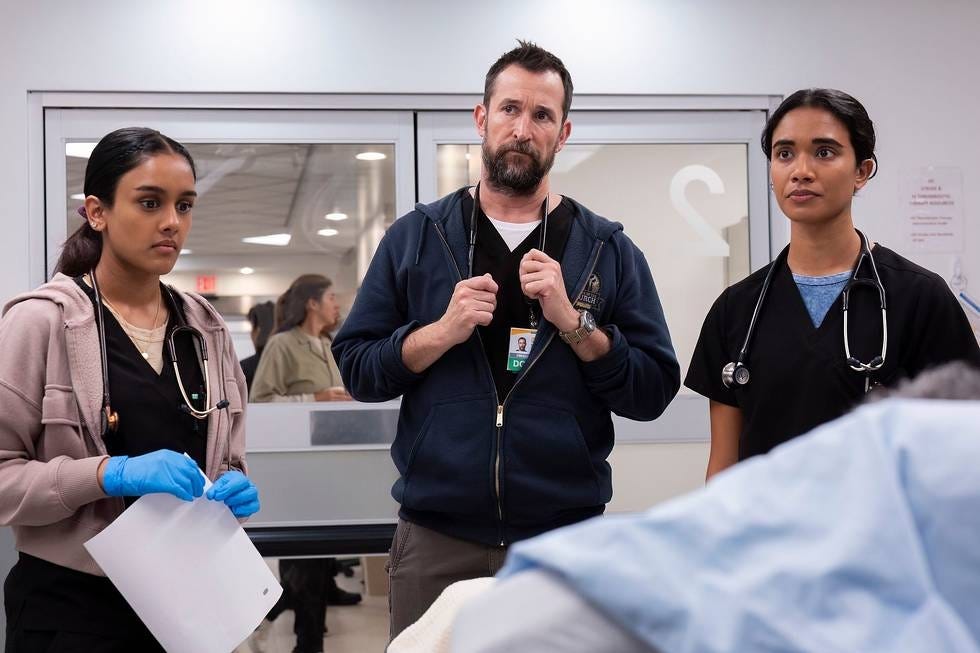
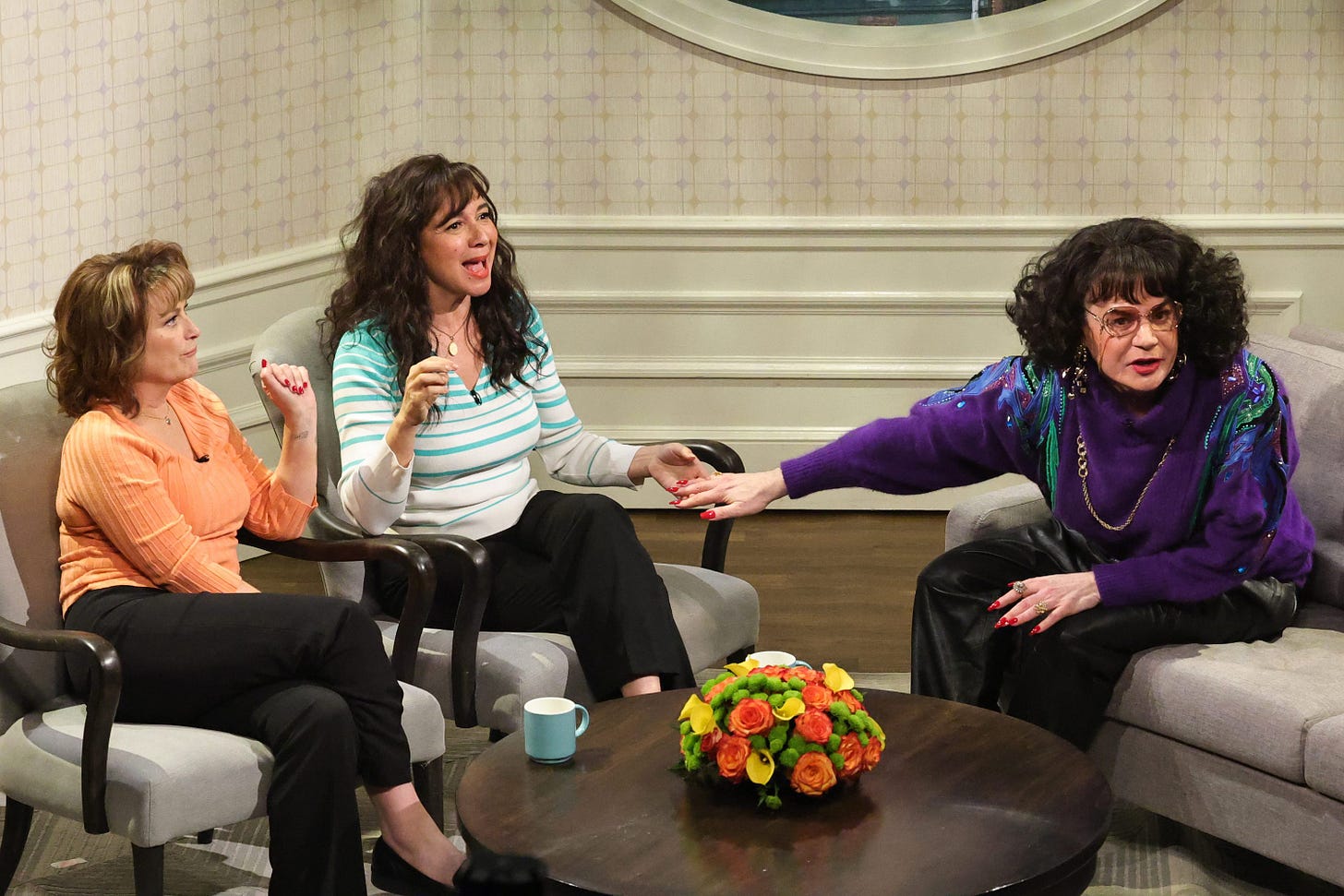
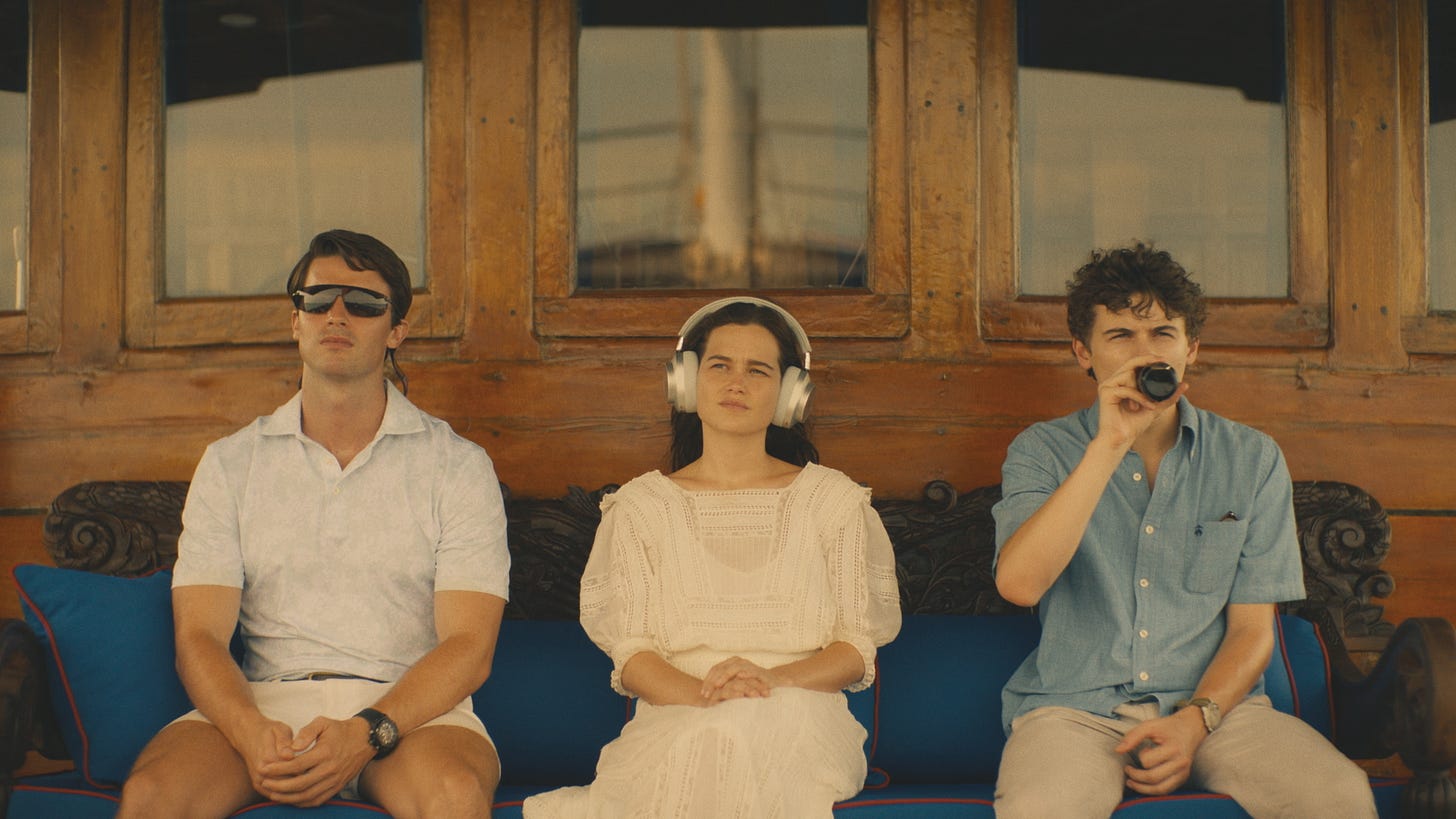
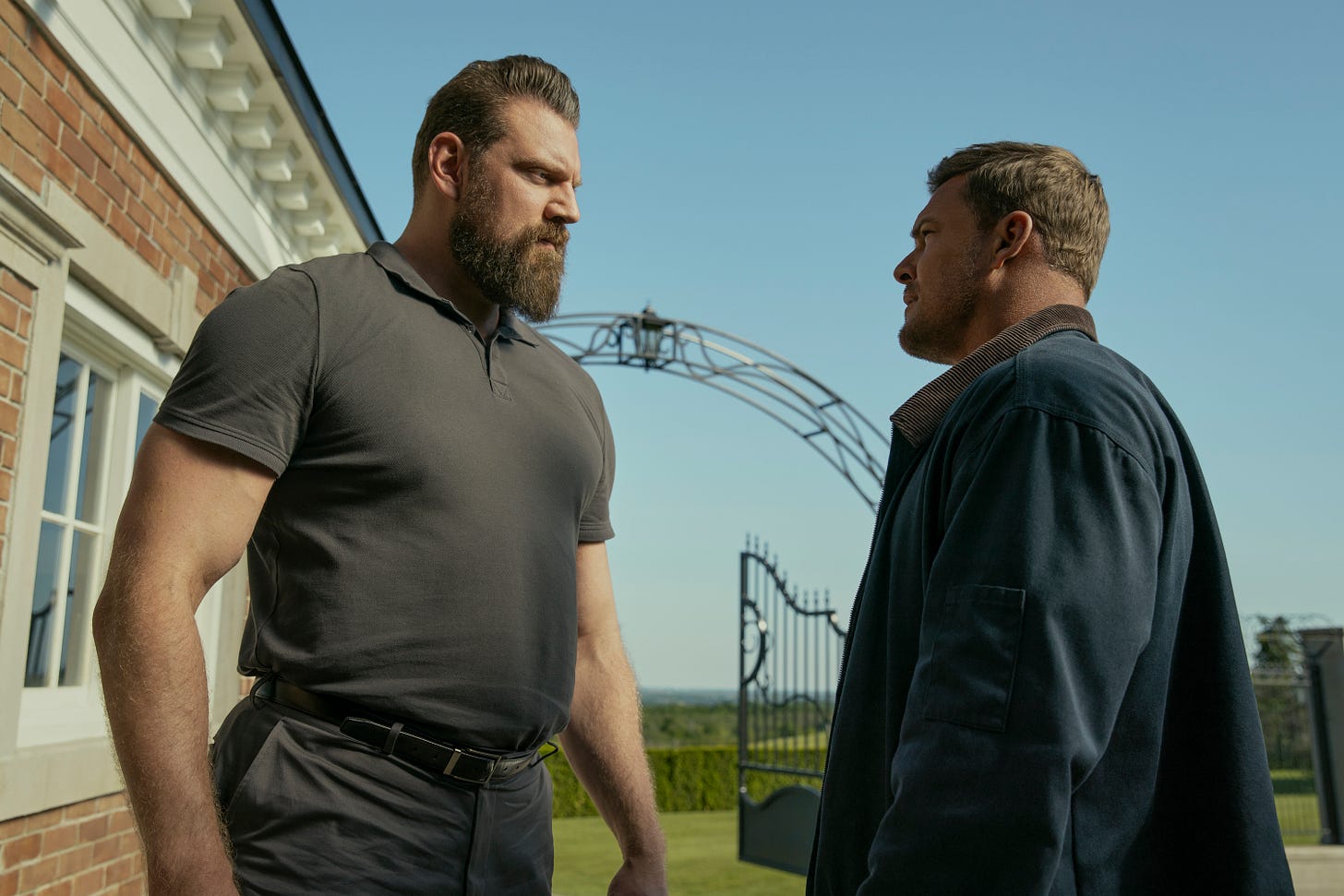
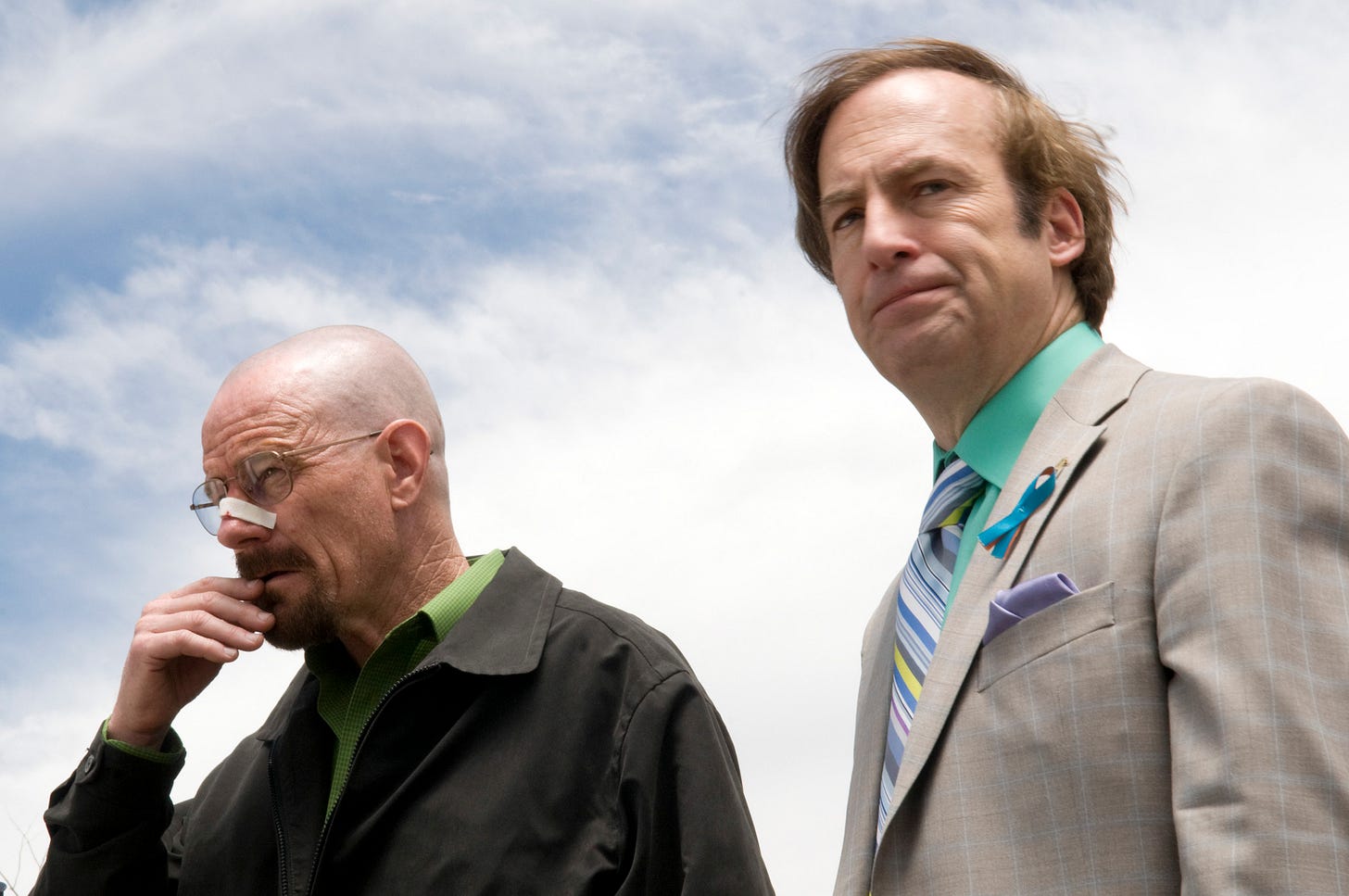
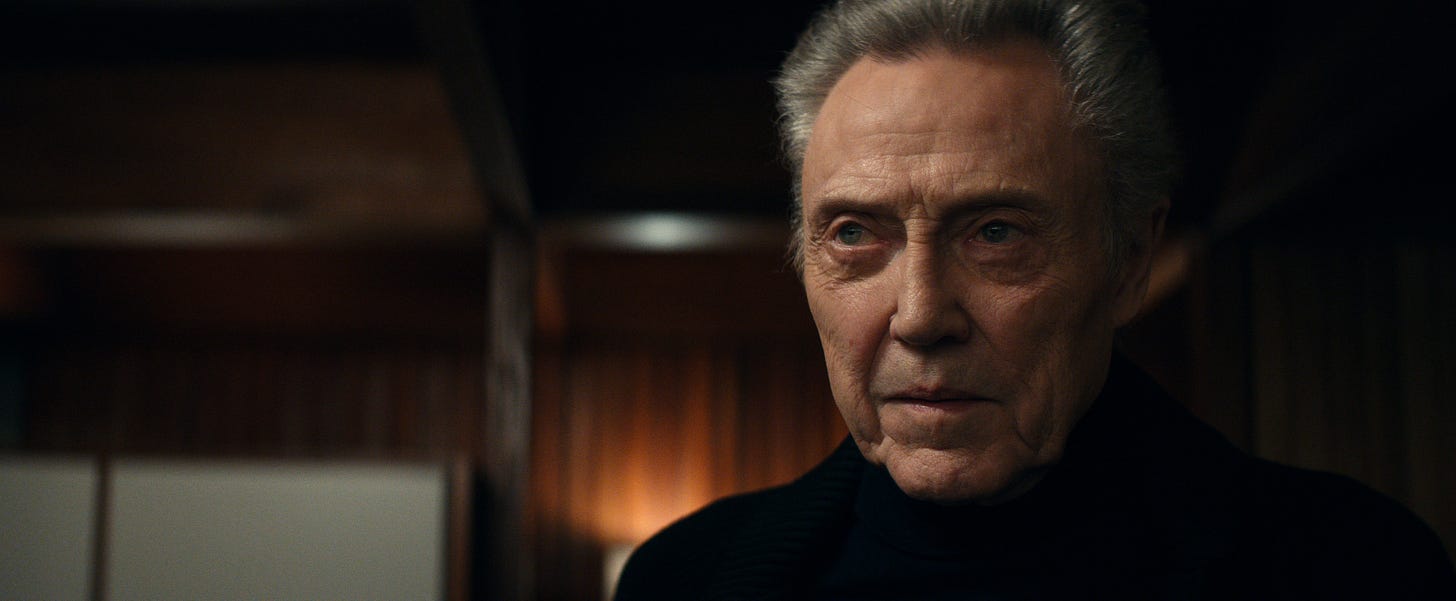
I think there is a little something more going on with the Gretchen/Dylan scenario. I think Gretchen is actually seeing a difference between innie and outtie Dylan and is actually becoming more attracted to one Dylan because he seems more responsible and proud of achievement. Outtie Dylan is focused on getting a car they can not afford and she is talking to him about being responsible.
I don’t think Helly and Mark being intimate was “revenge sex” against Helena. It seemed more an attempt on Helly’s part to take back some control herself and not let Helena have something that she wanted. I think she also sees that Mark is mad because Helena manipulated him to believe that Helly wanted the same thing and that she tricked him the entire season to believe they were connecting.
A point that I think is kind of important with respect to the Severance recap: Burt and Fields say they are Lutheran. Burt says it was Jesus who brought him to Lumon (“Jesus Christ?” “That’s the one!”). Knowing that Christianity exists in the show seems relevant given the cult of Kier and other disorienting elements of reality.